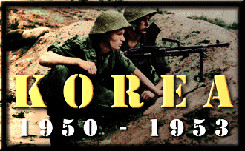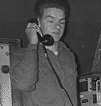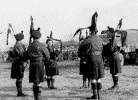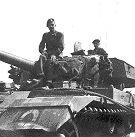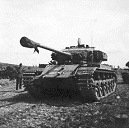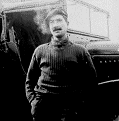The Han River
By Fred Cox US 51st Signal Battalion
I had not felt the exotic atmosphere of the Orient until that first sight of you, the majestic Han River. Why you impressed me the way you did, I do not know. Perhaps it was the sampans, ancient and worn, or was it the fog rolling in from the Yellow Sea, encompassing your mouth, and the Capitol City on your opposite bank? It may have been the anticipation of visiting the mysterious city of Seoul. Only here at your journeys end do you impress us, the American GIs, with this feeling of the wondrous Orient.
Since our first encounter we have met many times. In the moutons of the north you rapidly grow from a brook, to a stream, to a river. Through these picturesque, but unproductive mountains, you twist and turn like a dying snake. Your banks are steep and you run deep and swift. When at last you do occasion into a small but flat valley, you spread out and slow up, as if to relax, to warm from the abundant sun and to allow the many rocks a chance at scratching your tired back. It is here in these small, clean valleys, where you give your fun loving people a chance for a good swim. The pool formed at the lower end of the valley, with its beaches of mica and sand, produce an ideal recreation centre for the nearby village to enjoy the refreshing qualities of your body. The huge boulders along your banks give the mothers of the village a community laundry station and an opportunity to engage in the universal habit of gossiping.
After you have run the mountainous race from the north, you break out into the more open, rolling hills of the south. You become more like the elder of the village, reserved, determined and relaxed. You have lost the attitude of the jubilant young boys of the village. The rice paddies, the barley fields, the cotton fields, and the occasional orchards are now lining your banks and covering the surrounding hills. Here in the south you are a little wider, a little straighter and a great deal dirtier than you are farther north. In your path there are many sand bars and occasional islands covered with grasses, shrubs and a few trees. Near the larger villages are found a few overloaded sampans, ferrying the transients from one bank to another.
You, mighty Han, have aided your natives in becoming a nation of self-supporting people. Developing your country has not been an easy task, for your people are using farming techniques and mediums of transportation dating from many centuries before the Chinese invaders of the fifteenth century. I have often thought that you and your people were much alike. Neither of you are too much of any one thing. Your natives are not very tall or too short, just as you do not rank among the big rivers of the world. You become rampant and enraged once a year, just as your people are known to drop their reserved attitude and explode in a burst of temper.
July and August provide you with your excuse to blow your lid, to burst your banks and to destroy all that you can. The rains begin with a cloudburst and do not let up for several weeks, except for the welcome breath the storm must have before it begins another assault. You rise rather rapidly as you soak up the rains. The overhanging trees, the fertile banks, the fool who dared to trespass, are swallowed in your rush to the Yellow Sea. You become swollen, filthy, and dirty and you are ugly. You do not give up this fit of temper until the storm has run its course. You slowly subside, give up a few of the fools and become cleaner and quieter. Not until the flooded fields are dried do your people again show their respect and love for you. They, the people, may work you, may travel you and may enjoy you without fear.
(When I originally wrote this in 1959 I did so with the mistaken knowledge that the Han turns and goes north. It does roll to the south as I have recently learned. I was on the Pak Han tributary thinking it was the river itself.)
My First Taste of British Issue Rum
Our team from the 51st Signal Battalion was assigned to the 29th British Brigade in early December at Pyongyang. We had been with the 1st Cavalry Division on the Yalu River until the Chinese chased us south. We provided telephone service from the Brigade, to I Corp Hdqtrs. Most of the calls were for logistics and material, both ground and air support. We also provided Teletype circuits for the intelligence people.
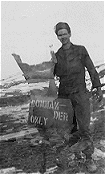 Fred at the commanders privy (crapper)
Fred at the commanders privy (crapper)It's a double exposure--the privy and Fred
holding frozen long johns
Since the Brigade fought the rearguard action for the city of Pyongyang, our group was the last to cross the bridge on the run to the south, as we had to keep communications in until the last minute. The next thing I recall was that the next day, under fire, we stopped to make tea. That impressed us (American GIs) to try for the most southerly end of convoys while headed south. We went on to the peninsula area somewhere near Haeju. Because the Chinese and North Korean infantry were getting too close, the Brigade made a dash east to Kaeson. Please remember that we did not always know where we were so there is some error in locations I do believe. We were at Kaeson for several days and while there we were given our first taste of British issue rum. I spit flames for two days - only a slight exaggeration. The Master Sergeant at Brigade Hdqtrs was a large man with a big moustache, and a very nice guy.
We then were sent to just north of Seoul so that the Brigade could again fight a rearguard action for the city. Our communications team set up on the highest hill near the Han River, so that we could communicate with I Corp. That set-up was in the home of the American Ambassador. Glad he was not home to see what we had to do to the house. It was bitterly cold on that hill with the wind coming in from the Yellow Sea. Plans were changed and the 29th was sent south in several steps until we reached somewhere between Osan and Taejon. The Brigade then went somewhere south of the 38th parallel in the eastern section of I Corp's part of the front. As best as I can recall I believe we were pushed back some distance and again made an advancement. By this time it was about the middle of March or the first of April and our team was reassigned to another unit.
'The below pictures are of my friend Harry. He was a commander and he spent his free time with us when he was back at Brigade Hdqtrs. This was at Suwon May 1951. I do not recall Harry's last name.'
My stay with the 29th was a good one and I met several men that were very helpful. Harry, a Centurion tank commander usually came to stay in our tent when he came back to Hdqrs. All I remember is that his name was Harry. We did enjoy a vast amount of opportunity to buy spirits of every sort from various places in the world. Oh, yes, we did tire of tea, so we managed to get several pounds of coffee and made a mistake--don't let an English cook make coffee. He used it all for one small pot.
The above picture is a shot of one of the Brits who was with Hdqrts. of the 29th. His name was Bob and there is a possibility that he was the sergeant in charge at Hdqtrs
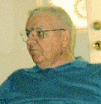
Fred Cox
Dec 2000
Fred sadly passed away on 10th December 2008.

